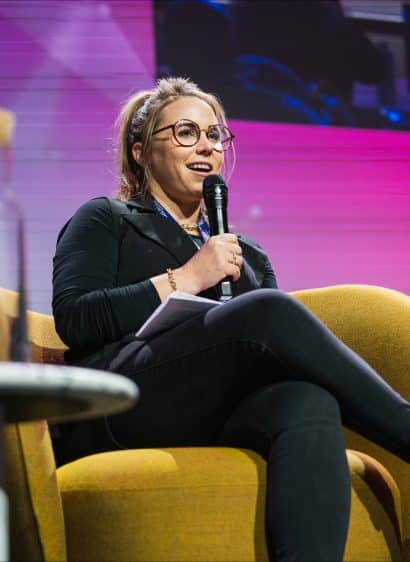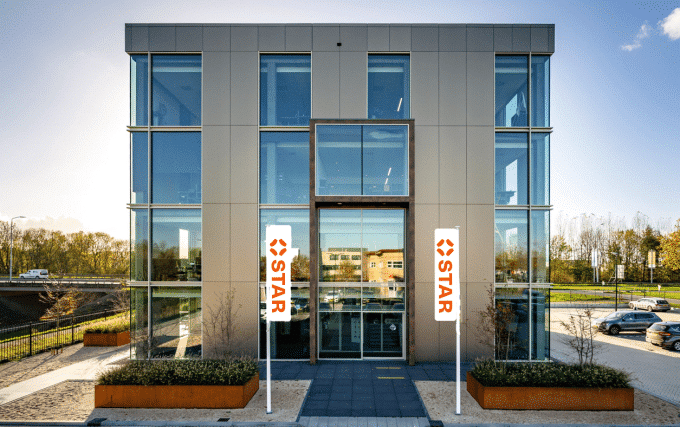‘Bottom line, you want the figures to be solid.’ That is not exactly a shocking statement coming from a Sales Director. Sari van Tendeloo is such a Sales Director. In this case, of STAR Belgium, a label of The Specialist Group (TSG). But, behind the daily flow of figures and contracts, she finds something else important: Diversity, Equity & Inclusion (DE&I). Sari: “These are three themes that do not only play a role within HR. They play a role in our company’s growth, as well as in clients, the market, and society.” Yet Sari prefers not to advertise that overly. Here is why.
As a recent graduate, Sari entered STAR’s Antwerp office with a Master’s degree in Law. To start in Legal? No, surprisingly, she chose Recruitment as her game. This was ten years ago. When Sari later progressed to Sales, her colleagues were introduced to intrinsic motivation in a musical way that can easily be classified under DE&I. Here’s what happened. A Beyoncé song would blare through Sari’s speakers with every placement: ‘Who run the world? Girls!’ An anecdote that Sari substantiates in 2024 as follows: “That was mainly to remind me that with hard work, you should be able to achieve anything.” Something that is not self-evident for a woman in the technical world at that time, but which Sari was impressed upon in her youth.
Seizing opportunities with STAR
As a scion of an entrepreneurial family, Sari knows from an early age that hard work and a healthy dose of independence can go a long way. Add some personal ambition, and you will have a fertile breeding ground to develop into a manager. “But you also have to be given the opportunity to do so,” Sari adds. “And STAR has given me that opportunity from the start. To grow, to travel, and recently, to obtain an Executive MBA at Vlerick Business School. That is how I ultimately became the first, and fortunately no longer the only female director at STAR.” From this position, Sari wants to set a good example for today’s young professionals.
Or, as she prefers to say: “From this position, I can address themes such as diversity, equality, and inclusion in my way on all kinds of platforms.”
‘STAR has allowed me to grow, to travel, and recently to obtain an Executive MBA at Vlerick Business School.’
Setting the stage in Paris
The WEConnect International Europe Supplier Diversity & Inclusion Conference in Disneyland, Paris is one such platform Sari gratefully uses. She discussed the current challenges for women in technology with colleagues. “In the technical sectors, much value is still attached to full-time availability, and remote working has not yet been widely embraced. That makes it more difficult for female professionals, who often have a childcare burden.” Nevertheless, Sari sees that the technical world is continuously evolving. Sari: “In Paris, I spoke to a supplier who develops overalls, safety harnesses, and safety shoes, specially designed for women. Yes, it is great that these practical initiatives also contribute to a greater change.” That makes you curious about how Sari and her teams contribute to the change. Two clear answers are ready: internationalization and traineeships.

Internationalization as a new perspective on building bridges
Regarding implementing the DE&I strategy within STAR, Sari identifies international recruitment as a key focus. “The organization has set up an International Recruitment Team. A team that specifically focuses on recruiting global talent,” she says. “For this purpose, new team members from countries including Finland, Italy, and Spain have been brought to Antwerp.” From the bustling city on the Scheldt, this diverse team now recruits white-collar specialists for various clients. This strategy ensures a mix of cultures within STAR and a broader perspective that benefits clients. “In more diverse teams, specialists also learn more from each other,” Sari explains. “Everyone brings different perspectives and experiences.”
Internationalization also has practical advantages. In an era where projects no longer occur on one site but processes run in different countries, specialists with a solid knowledge of languages and cultures are essential. “We recently found a specialist who, with his background, could bridge the gap between a design team in India and the local branch of a client in Belgium. That person is now a crucial link in team collaboration.” This is a fitting example of how Sari underlines that diversity is not only a beautiful ideal, but one that adds concrete value to business operations.
Traineeships as a breeding ground for talent and innovation
In addition to international recruitment, STAR’s traineeship program also plays a key role in diversifying the pool of specialists. “We look beyond the right papers here, we also look at the potential of new talent,” says Sari. “Young people and lateral entrants bring fresh ideas and challenge existing structures and thought patterns. That ensures more innovation.” And that last point is not just a statement, but a scientifically proven fact.
Yet, that scientifically proven fact faces a challenge. Because hiring managers are not always open to that challenging pool of new talent. They often prefer to choose the trusted specialist they have worked with for years. “I would like to inspire those hiring managers because specialists from different generations can strengthen each other enormously.” The current labor shortage may help her in that mission. “Companies that do not embrace diversity miss out on opportunities. They have a smaller pool of specialists at their disposal but are also a less attractive employer for the younger generation, which attaches great value to a culture where everyone feels welcome,” says Sari. “If we were all more open-minded, there might be less labor shortage.”
‘I would like to inspire those hiring managers because specialists from different generations can strengthen each other enormously.’
No symbolic politics
Sari will not applaud using DE&I as a marketing tool. Sari: “Just like with greenwashing in the energy transition, we also see companies that claim to value diversity but, in practice, do little to deliver. A beautiful diversity policy on your website is nice, but what exactly are you doing if you don’t have a single woman on your board?” That is precisely why Sari goes beyond filling in a basic checklist and continues working for Diversity Equity & Inclusion within TSG based on intrinsic motivation, including with her clients. She does this in the way that suits her best: driven, committed, and honest. “Because it is not about shouting out the perfectly written policy from the rooftops,” Sari concludes. “It is about constant dialogue, learning from mistakes, and looking at how to do better tomorrow. That is how we grow.”



